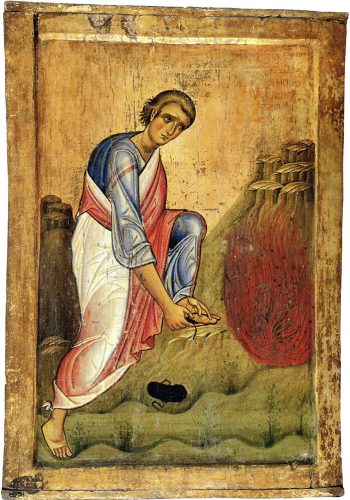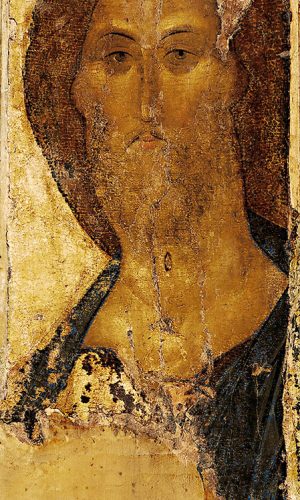
The first Sunday after the Descent of the Holy Spirit is dedicated to all saints. There are two major reasons why we celebrate all the saints today. Firstly, because it is directly related to the descent of the Holy Spirit. The Holy Spirit is not visible, but His work is seen in the saints. In them you can see how the Holy Spirit works. He works within us, urging us to follow Christ. Respecting our freedom, He urges us like a mother to follow Him. This is what we are talking about today in the Gospel, about following the Lord. The Holy Spirit urges us from within to follow the Lord, and those who obey Him are made holy. The saints are those in whom the Holy Spirit has worked with power. And the second reason why we celebrate all the saints today is that there are so many saints that they cannot even be all inscribed in the calendar.
Today, we heard in the Gospel some firm or categorical words of the Lord. And therefore, we thought to start with another word, just as categorical, but also very beautiful, which was heard last night at Vespers, in the Old Testament readings, passages that are read at a feast to strengthen the feast. The word is from the Prophet Isaiah, chapter 43, verses 10-14, in which God speaks through the prophet: “‘You are My witnesses,’ says the Lord, ‘and My servant whom I have chosen, that you may know and believe Me, and understand that I am He. Before Me there was no God formed, nor shall there be after Me. I, even I, am the Lord, and besides Me there is no savior. I have declared and saved, I have proclaimed, and there was no foreign god among you; therefore, you are My witnesses,’ says the Lord, ‘that I am God. Indeed, before the day was, I am He; and there is no one who can deliver out of My hand; I work, and who will reverse it?’ Thus says the Lord, your Redeemer, the Holy One of Israel.” It is one of the few places where God affirms Himself so strongly and so categorically. There is no other God, nor will there be any other. God revealed Himself thus to Moses: “What is Your name?” And God answers: “I AM WHO I AM” (Exodus 3:14). Therefore, says the Lord: “you have no life in you” (John 6:53), “for as the Father has life in Himself, so He has granted the Son to have life in Himself” (John 5:26). But we do not. We have our lives on loan. It is worth meditating on this reality that we learn from the mouth of the prophet Isaiah. Last Sunday, I mentioned that there is no connection between our world and the world of God, and that only the Lord can make the connection between them. Between this holiness of God and us, with our many falls and follies, there is a great abyss.
In today’s Gospel, the Lord begins by saying that whoever will testify about Him before men, and He will also testify for them before the Father who is in heaven. “But whoever denies Me before men, him I will also deny before My Father who is in heaven” (Matthew 10:32–33). And then there are heavy words: “Do not think that I came to bring peace on earth. I did not come to bring peace but a sword” (Matthew 10:34). Then he says a word that stings us somewhat: “He who loves father or mother more than Me is not worthy of Me. And he who loves son or daughter more than Me is not worthy of Me. And he who does not take his cross and follow after Me is not worthy of Me” (Matthew 10:37–38). Therefore, this is also the Gospel of following Christ. These are categorical words, but I would like to read them in the same note as the first text, in which God states that there is only one reality: namely, Himself. There is no other reality besides Him. There is nothing else that we like besides Him. “Behind the mother, the father, the son, the daughter, I am. I have given you life, I help you, I forgive you. I give you kindness, I sustain you. There is no other reality than Me, and I beg you to understand this. If you live away from Me, you live incorrectly, you do not live the true life. Only if you immerse yourself in Me, if you connect to the fountain of life, you will truly have life within you and you will have love, kindness and enjoy everything. If you see your neighbors as My gifts to you, you are worthy of Me; if you do not see them, My gift to you has become a wall that prevents you from seeing Me.” And the same: “He who does not take up his cross and follow me” will not have life. “Because I have come to bring you life, and only by following me can you have life.” That is the meaning of the words of the Gospel today.

That’s what happens to the saints. They have experienced these realities fully. And, as Saint Sophrony says, they made the Gospel the law of their lives. And so, they lived, they adhered to these truths with all their strength. In them we see what the Holy Apostle Paul says beautifully in the Epistle to the Hebrews, chapter 11, which is a hymn dedicated to the saints: “through faith they subdued kingdoms.” We see in the saints this incredible power that a vulnerable, helpless person like us can acquire. They reach such strength that they can stand against kingdoms. We have enough examples. Saint Basil the Great, when the prefect called him and threatened him, remained dignified. And when the prefect marveled at his dignity, St. Basil replied: “I notice you have not known a servant of God until now.” So, faith in God returns kingdoms. And we also have our fathers as examples, like Father Arsenie, who rose up against the atheist teaching while in prison.
The saints acquire such power that they can resist kingdoms. They are bearers of truth. Bearers of great truths. But in this world, which is very different from the world of God, these truths are strange, and you need to be very strong to support and resist them. The saints did that.
The Lord is the Creator of the universe. He made man in His image. Yet, the man fell and came into a deplorable state. But the Lord comes, He incarnates Himself in this world which had so far departed from Him, which was more in the dominion of the evil one, He endured like us all the temptations of the evil one, by which he tried to make Him behave differently than as He is. In our perverted world it was not easy for Him to be righteous. However, He did not behave in any other way. In fact, all His work was to make His human nature strong enough to bear the whole truth about God. The Lord was constantly challenged. There were assaults of all kinds. Some praised Him, others spit on Him, and others threw stones at Him. But He did not behave otherwise than He was. And no one can make Christ behave differently. And this power, He also gave it to the saints. When the last Optina Elder, Saint Isaac, was threatened to leave before the monastery was forcibly closed in 1923, he said: “No one can separate me from my cross.” He was a confessor. They eventually killed him in 1938, but he did his duty.
Through many tears, the saints acquire this strength, which Christ first showed to us on earth. He came and said to us, “This is man. This is how I want you to behave.” If we understand that among all beautiful things in the world, what Christ has accomplished in the Gospel is the most beautiful, and we understand this without thinking of rewards and anything similar, then we place ourselves on the position of Pascal’s wager: “I have nothing to lose. If there’s no God, I have lived a good life. But if God exists, I have won everything.” If we understand that being a true human like Christ is the most beautiful, we have already won. Without looking at the reward. And it’s good to sit in this position, without rewards, without expecting anything. But if we know where we stand, we know that we are how we are for Christ. And if we are here like Him and with Him, we will be there also. But that’s not what we care about. Rather, we desire to be like Him, because He is the most beautiful and desired thing in the universe.
